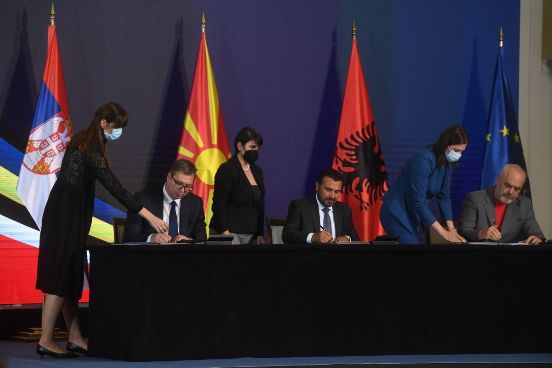The President of the Republic of Serbia Aleksandar Vučić and Prime Ministers of the Republic of Northern Macedonia and the Republic of Albania, Zoran Zaev and Edi Rama, met on July 28th and 29th in Skopje, at a two-day summit of the regional cooperation initiative known as the mini-Schengen ", which was agreed to be called "Open Balkans" in the future.

The goal of this initiative is to establish four freedoms in the region which EU is based on, ie its internal market - freedom of movement of goods, workers and capital, and freedom to provide services.
The President announced that from January 1, 2023, there will be no borders for citizens of the three countries.
At the Economic Forum for Regional Cooperation, held on July 29 in Skopje, President Vučić signed three documents with Prime Ministers Zaev and Rama:
1. Memorandum of Understanding and Cooperation on Facilitating the Import, Export and Movement of Goods in the Western Balkans;
2. Memorandum of Understanding and Cooperation on Free Access to the Labor Market in the Western Balkans;
3. Agreement on Cooperation in Disaster Protection in the Western Balkans.
The first memorandum will increase and improve economic cooperation, simplify as much as possible the procedures related to import, export and movement of goods.
The Memorandum on Free Access to the Labor Market aims to simplify the procedures for all contracting parties to obtain work permits for nationals of each of the three countries, as well as to use the work permits obtained in the territory of any of them.
The Disaster Protection Cooperation Agreement aims to help the parties, in accordance with their available capacities, to assist each other in case of a disaster, when the requesting party is unable to cope with consequences of the disaster using its own resources.
When it comes to the openness of the "Open Balkans" initiative for the accession of other partners, the signatories expect that, in the near future, Montenegro and Bosnia and Herzegovina will join the initiative, to which the invitation to join has been sent from the beginning. The invitation to join this format of cooperation was also sent to the representatives of the Provisional Institutions of Self-Government in Pristina.
The President of Serbia, Aleksadnar Vučić, emphasized that sincere mutual trust has developed in the last two years and that is why it is important to show citizens of the three countries that we are able to make decisions on our own, take care of ourselves, improve our lives and be on the road to EU, work with everyone and not wait for someone to admit us somewhere, but to change our own destiny and that the three countries will have at least one percent higher growth rate in two years compared to other countries in the Western Balkans. He explained that there will be unified registers from all three countries that will facilitate access to the profile of workers, and that the trip to Vienna or Tirana will be shortened by five hours when the borders between the three countries are abolished. He said that countless possibilities open up for everyone. "Political issues are also easier to resolve when you connect economies," said the President of Serbia.
The Prime Minister of Northern Macedonia, Zoran Zaev, said that the country is well connected to cities throughout Serbia by roads due to the construction of highways in Serbia. He also emphasized that Serbia is a leader when it comes to the construction of high-speed railways, since it is already building a railway from Belgrade to Budapest and is planning a construction with its own and European funds.
The Prime Minister of Albania, Edi Rama, stated that this initiative is of a strategic importance for Albania, but also that the region needs it if it wants to develop economically and move forward, and not remain a "prisoner of the past", and that unresolved issues in the region will not be easier to resolve if the potential of that association is denied and if all countries do not move towards a positive vision in the future.